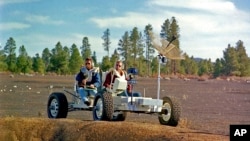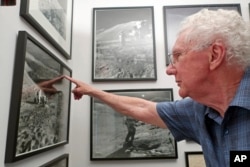Northern Arizona, in the southwestern United States, has deep ties to the U.S. space agency NASA.
Every moon-walking astronaut in the Apollo program trained there. Even a crater on the moon was named in honor of the city of Flagstaff, Arizona.
Benjamin Carver is a public lands historian at Northern Arizona University. “It’s really cool to think that this relatively small town in northern Arizona [Flagstaff] played such a big role in the Apollo missions,” he said.
Gene Shoemaker often receives credit for Arizona’s role in the moon missions. He once worked as a scientist for the U.S. Geological Survey. In 1963, he moved the agency’s astrogeology office to Flagstaff.
It was not long after the move that Shoemaker guided astronauts such as Neil Armstrong and Buzz Aldrin on visits to Meteor Crater, near Flagstaff. He wanted to make sure that the Apollo program would include geology.
Lauren Edgar is a research geologist at the Astrogeology Science Center. She is working with NASA’s 2017 class of astronaut candidates. The space agency plans to send them to Flagstaff later this year for field training.
“It will be pretty inspiring for them,” said Edgar. “It’s inspiring for us being involved in this.”
Flagstaff is among many cities celebrating the 50th anniversary of the first moon landing on July 20,1969.
It is celebrating the anniversary with guided tours, demonstrations, talks and moon-related food and art.
Retired Flagstaff geologist Gerald Schaber plans to celebrate the big event by wearing a turquoise bolo tie. A bolo tie is a kind of string worn around the neck. It is common in the Western half of the United States.
The bolo tie distinguished Shoemaker’s Arizona crew from others who worked on moon missions.
Schaber was at NASA’s Mission Control in Texas in 1969, watching black-and-white images from Apollo 11 while bending over a map.
“I was just trying to do the best I could with the primitive tracking ability we had in those days,” he said from his home in Flagstaff.
There, he has a picture of an area on the moon that Apollo 15 astronauts called “Schaber Hill.”
Arizona has approved a nomination to list several of the training areas near Flagstaff on the National Register of Historic Places. Federal approval is still needed.
I'm John Russell.
Felicia Fonseca reported on this story for the Associated Press. John Russell adapted it for VOA Learning English. George Grow was the editor.
_______________________________________________________________
Words in This Story
crater – n. a large, rounded hole in the ground or on the surface of a planet or the moon
cool – adj. excellent; used to show agreement
role – n. the duties of someone or something
mission – n. an important project or program
astrogeology – n. a kind of planetary science concerned with the geology of planets, moons and asteroids
inspiring – adj. causing people to want to do or create something
distinguish – v. to make (someone or something) different or special in some way
tracking – adj. following the movement of someone or something
We want to hear from you. Write to us in the Comments Section.







